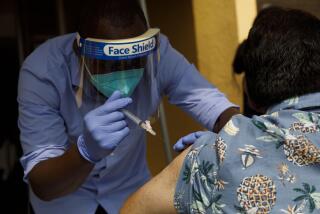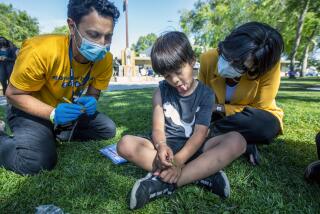Distrusting the shot
- Share via
Oakland — JIMMIE INGHRAM, a 70-year-old African American, had his last flu shot 30 years ago.
“It made me real sick,” he said as he played a video game at the Golden Agers Senior Activity Center.
Since then, Inghram has avoided the vaccine, as have many others at the center, even though free shots are offered periodically in the same building.
As the country faces another flu season -- heightened by the news of bird flu in Asia and Europe -- health officials are grappling with a seemingly intractable problem: Many Americans, particularly blacks, don’t trust annual flu shots.
In 2004, 45% of blacks over age 65 -- the age group most susceptible to the illness -- received the shots, according to figures from the Centers for Disease Control and Prevention. That compares with 55% of Hispanics and 67% of whites. About 53% of Asians got the shot, but public health officials consider that figure to be abnormally low, possibly due to vaccine-supply problems last year.
The disparities partly explain why African Americans are 6% more likely than whites to die from seasonal flu or pneumonia, a common flu complication, according to the CDC.
Unlike many healthcare disparities, cost is not the main problem. Flu shots run about $15 to $30, but most seniors are covered by Medicare.
Health officials said the problem is educating people about the benefits of flu shots and improving access to them.
Decades ago, adverse reactions, like those Inghram remembers, were common. Today’s shots are safer, although they can still cause sore arms and rare fevers.
“The myth that you can get flu from the flu vaccine continues to be alive and well” even among healthcare workers, said Dr. William Schaffner, chairman of preventive medicine at Vanderbilt University in Nashville.
A 2003 study published in the Journal of Health and Human Services Administration found that about 55% of black seniors in Texas believe that flu shots cause or could cause flu, compared with 23% of elderly whites.
There are other fears.
One oft-repeated incident that has fostered suspicion in the black community is the “Tuskegee Study of Untreated Syphilis in the Negro Male,” which from 1932 to 1972 studied 399 poor blacks in Alabama suffering from the sexually transmitted disease. Many of the men were allowed to suffer and die even after penicillin, which cures syphilis, became available in 1947.
“The sad part is that people are not convinced that it is a thing of the past,” said Dr. David Satcher, former U.S. surgeon general and now interim president of Morehouse School of Medicine in Atlanta.
Jonathan McGhee, 46, an African American employee at the Golden Agers Center, added: “A lot of things that happened to black people in the past are in the folklore .... Everybody knows about the syphilis study.”
McGhee said the recent warnings from President Bush that bird flu could eventually mutate and cause a human pandemic only made him suspicious that the government was trying to distract people from problems in Iraq and New Orleans. “Bush is in trouble, and all of a sudden we have a pandemic flu threat,” he said.
To encourage more blacks and Latinos to get a flu shot, the California Department of Health Services and the San Francisco Department of Public Health conduct annual advertising campaigns aimed at mothers and grandmothers.
“It’s about trying to get to the gatekeepers, the people who make the healthcare decisions for the family,” said Janet Zola, a health educator with the San Francisco program.
Other counties dispatch health educators to churches and community groups in minority neighborhoods to talk up flu shots.
Dr. Jonathan E. Fielding, Los Angeles County public health director, said it is important to build confidence now in the flu shot in case of a human outbreak of bird flu. (There is no commercially available vaccine for the bird flu, but one could be available sometime next year.)
While bird flu is still primarily an animal disease that rarely infects humans, planning for a pandemic has become a top priority as the virus moves closer to North America.
Fielding said his department intends to work closely with minority community leaders in formulating a plan to deal with a possible bird flu outbreak.
In Los Angeles County in 2003, 57% of black seniors had a flu shot, compared with 67% of Hispanics, 75% of whites and 84% of Asians, according to a UCLA survey.
To boost those numbers, this year the county Department of Health Services will sponsor 195 free flu shot clinics.
San Francisco offers shots at churches and food banks. Alameda County has tried drive-by clinics in the parking lot of the Oakland Coliseum sports complex.
Such efforts have begun to pay off. Nationally, vaccination rates for all racial groups have better than doubled since 1989.
Celestine Henderson, an African American leaving an Oakland flu-shot clinic, was surprised to hear that many of her neighbors shun vaccinations. She and her husband have been getting the shot for five years. “We’re over 60, and we know it’s for our health,” she said. “It does work, usually, if you take care of yourself.”
Counties would like to serve many more customers, but their resources are stretched.
Dr. Christian Sandrock, a UC Davis infectious disease expert who heads an program to reach underserved areas, said that undocumented Latino immigrants present special challenges. Many of them live in rural parts of the state where clinics are sparse and reaching people can be more difficult.
“They’re afraid,” said Antonia Molina, 61, of Oakland, who got her flu shot earlier this month. “Maybe they don’t have their papers, and questions might be asked.”
Flu shot clinics generally don’t require patients to provide identification, but countering fears about vaccination requires constant attention, said Dr. Howard Backer, who heads California’s immunization program.
“The time to do it is not during a pandemic,” when health systems could be stressed to a breaking point, he said.
More to Read
Sign up for Essential California
The most important California stories and recommendations in your inbox every morning.
You may occasionally receive promotional content from the Los Angeles Times.










